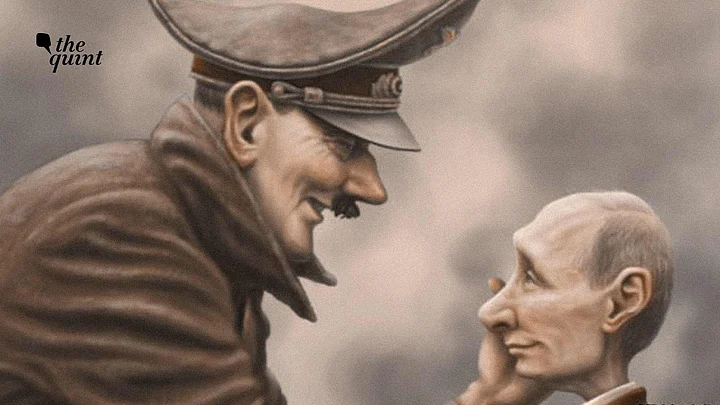As Russian troops began their assault on Ukraine earlier this week, a Twitter account with the handle @Ukraine broke the internet on Thursday, 24 February by tweeting a political cartoon featuring Vladimir Putin and Adolf Hitler.
It even went on to say that its tweet was not a meme but rather depicted Ukraine's current reality.
The Twitter handle @Ukraine was created in 2016 by Yamera Dukh, who worked in the press bureau for the Ukraine's presidential office.
By 2018, however, Dukh handed over the control of the handle to a bunch of collaborators, who still consult him on what to tweet.
The handle often tweets memes and cartoons because, as it told Washington Post, "humour has an enormous power, especially when facing a brutal, self-aggrandising and extremely serious authoritarian regime like Russia."
Nevertheless, it has ignited conversations around the similarities and differences between Russian President Vladimir Putin and the Nazi Germany Chancellor Adolf Hitler.
Is the comparison justified? What does history tell us?
The Justification for War
There is an eerie similarity in the justification that Putin gave for invading Ukraine and the justification that Hitler had given while annexing Czechoslovakia in 1939.
The Nazi dictator had claimed that the German speaking people of Czechoslovakia were desperate for liberation, and it would be his responsibility to ensure that.
"I must also declare before the German people that in the Sudeten German problem my patience is now at an end. Czechoslovakia must give the Germans their freedom, or we will get this freedom for ourselves," the chancellor of the Third Reich had said on 26 September 1938.
Does that sound familiar?
Putin's words are not too different.
The goal of the "special military operation," he had said on state TV earlier this week, is to "protect people who have been subjected to bullying and genocide... for the last eight years," Reuters reported.
When Russia annexed Crimea in 2014, Putin had asserted, "In people’s hearts and minds, Crimea has always been an inseparable part of Russia," as quoted in Washington Post.
He had also claimed that the pro-Russia people in Ukraine's Donbas region have been facing genocide.
These claims, which are part of Putin's extremely effective disinformation campaign to rally the Russian people by his side, have been proven false by journalists and fact-checkers.
For example, Russia has been citing the existence of mass graves of civilians in Donbas to prove the genocide.
These "mass graves," however, are burial grounds consisting of either elderly people who died naturally or soldiers killed during the 2014 conflict that commenced after the Russian annexation of Crimea.
The Russian president, nevertheless, reiterated in his speech that "the killing of civilians… the abuse of people, including children, women and the elderly, continues unabated."
To 'save' and 'liberate' these victims, Putin, much like Hitler, argues that an annexation of the country that is oppressing them, is necessary.
There are, however, key differences between the two, at least for the moment.
The Differences
Putin hasn't launched a campaign of genocide against the Ukrainian people, like Hitler did with Jewish people across Europe.
Neither has the Russian government, through their propaganda, dehumanised the Ukrainians like the Nazis did with Jewish people, calling them rats and poisonous to the Aryan race.
Far from it, Putin keeps saying, as he articulated in his 5,000-word essay he wrote last year, that Ukrainians and Russians are 'one people.'
A final difference concerns Hitler going about conquering all of Europe.
At the infamous 1938 Munich Conference, four days after his declaration regarding the 'freedom' of German speakers in Czechoslovakia, Hitler was allowed by the European allied powers to annex Sudetenland and bring it under Nazi control.
The United Kingdom and France had hoped that this concession would prevent further aggression.
As we all know, they were wrong. Appeasement did not work and the Second World War erupted. Hitler went on to invade Poland, whose security had been guaranteed by Britain and France.
On the other hand, there is Putin, whose next move is unpredictable. After all, even two weeks ago, the Kremlin had stated that it had no intentions of attacking Ukraine.
Putin is aware, however, that if his troops, in order to revive the Russian empire, even accidentally lay their hands on Poland, then Article 5 of NATO will get triggered, leading to an all-out European war.
It is doubtful that he will do that, given that Belarus is Russia's only ally in the region, and Moscow will only invite more isolation if Putin goes down Hitler's path.
(With inputs from the Washington Post.)
